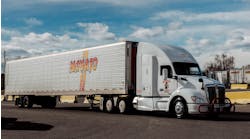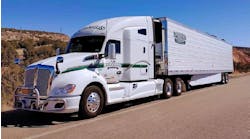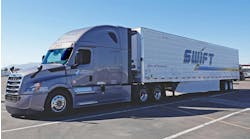Sunstate Carriers' reputation for integrity, delivering on promises fuels growth
Sunstate Carriers is a Florida-based refrigerated truckload carrier that operates east of Texas, servicing customers throughout the Midwest and Eastern states, and parts of Canada. More than 99% of its hauls are food products, with the main travel corridors being I-75 and I-95. Founded in 2000 in the central Florida city of Tavares, the company has since grown into a fleet of more than 100 rigs.
Tavares, a community of 15,000, is situated about an hour's ride northwest of Orlando. It is the birthplace of renowned NASCAR driver Edward Glenn “Fireball” Roberts, and where Sunstate Carriers' owner, Richard Baugh, began his career in trucking. That career has been built on being sensitive to customers' needs, providing a professional service at a fair price, and maintaining the highest levels of integrity and honesty.
Baugh created and grew this company from the “remains” of a previous refrigerated trucking operation he established. In 15 years, he expanded that business more than 215%, before deciding to sell it and retire — or so he thought.
He sold his business to a public company, only to see it poorly managed to the point that it had to declare its inability to pay debts, liquidate its assets, and try and settle up with creditors. Being the largest creditor, Baugh took the assets of his former company and got back into refrigerated trucking.
Fleet equipment
Sunstate Carriers has a fleet of 105 late-model sleeper tractors. Eighty percent are Freightliner Century models; 20% are International 9400s.
All new tractors are being outfitted with Thermo King's TriPac auxiliary idle reduction and temperature management system. “With APUs, we have reduced our fleet idle time from around 55% to about 3%,” says Baugh. “By decreasing idling, we not only save money on fuel, we reduce wear and tear on the engine, and that helps us lower our maintenance costs.”
The carrier also controls fuel costs by having on-site fueling. It has a two-island facility with a 10,000-gallon tank of diesel fuel. Drivers fuel their tractor and reefer after each trip. When fuel has to be purchased on the road, Sunstate Carriers has fuel-purchasing arrangements with a number of the truck-stop chains.
The fleet has 125 refrigerated trailers — all 53' with an air-ride suspension. About 60% are Utility Trailers, the rest Great Dane.
All refrigeration units are Thermo Kings, with the most recent purchases being high-capacity SB-III SR+ models. These come standard with a solid-state electronic microprocessor controller with digital display, a Cycle-Sentry start/stop control system that helps reduce fuel consumption, alert monitoring system, and a programmable defrost timer.
The units also have Whisper technology for quieter operation. Exclusive to Thermo King, Whisper technology features a new acoustical grille design and established sound-deadening components — extremely quiet engine, tuned intake resonator, special exhaust system and muffler, sound-proof material, special door gaskets, and sound-absorbing door.
Sunstate Carriers' rigs typically log about 130,000 miles per year, traveling mostly dedicated lanes. The majority of the operation is live loading and unloading of truckload shipments to and from distribution centers.
Average length of haul is around 950 miles, so driving teams aren't necessary, Baugh says. Drivers are out for a maximum of seven days. All drivers are assigned to trucks.
Tractors have a fleet lifecycle of five years; trailers seven years. Equipment is either traded in on new purchases or sold outright.
Sunstate Carriers has long standing relationships with its equipment vendors. These include Great Dane Trailers in Tampa, and Florida Utility Trailers, Mauldin International, Orlando Freightliner, and Thermo King of the Southeast, all of which are located in Orlando.
About a year ago, Baugh started equipping his tractors with PeopleNet mobile communications system for increased fleet visibility and communications. His systems include GPS satellite tracking, plus two-way, in-vehicle data and voice communications. Prior to this, drivers were issued cell phones.
Driver management
Finding or keeping drivers hasn't been had a problem, says Baugh.
“We're attractive to them because we're a truckload operation, so drivers don't have to handle freight,” he said. “But perhaps our biggest selling point is our ability to get our drivers back home. Most of our drivers live in Florida and are home every third or fourth day. This helps us a lot.”
So does treating drivers like professionals, he adds: “I have found throughout the years that no matter what the issue, if drivers know that you care about it, they care about it. If they don't think you care about something, then they're not going to care about it.”
There is also the matter of driver compensation. Along with a good pay plan and benefits package, drivers have the opportunity to increase their earnings. There are monthly bonus programs based on miles, safety performance, on-time deliveries, and miles per gallon.
“These programs allow some flexibility,” notes Baugh. “A driver can miss a goal and still earn a bonus. Our Double Diamond program is for drivers who hit every goal. They can make an extra $400 to $500 per month, and that's a pretty big incentive.”
Maintenance matters
Baugh says he has more difficulty hiring mechanics than drivers.
“We're seeing fewer and fewer people that want to be a mechanic. Nowadays, kids want to be computer technicians. They don't want to learn diesel mechanics or have to make the large investment in tools, which are quite expensive.”
Nevertheless, Sunstate Carriers has an experienced team of 13 service technicians to handle the 24-hour, seven-day-a-week maintenance operation.
“We can do anything here, including minor body work,” Baugh says.
There is an eight-bay service facility, with five trailer bays and three bays for tractors. A separate facility serves as a tire shop.
Baugh is big on professionalism, and feels that having a clean fleet helps project this. Rigs are washed after each trip. He requires drivers to keep the inside of their trucks clean as well.
“We monitor the cleanliness of our equipment pretty closely — inside and out,” he says.
Logistics operation
Shortly after starting Sunstate Carriers, Baugh formed a logistics operation, Sunstate Logistics, to be able to provide an alternative solution to customer needs. The operation has solid relationships with small fleet operators and independent contractors to provide transportation throughout the continental United States.
“In the beginning, the idea was to take freight that we couldn't handle and move it on the logistics side,” says Baugh. “The logistics business has grown, and now has its own base of customers.”
Sunstate Logistics is predominately a refrigerated operation.
“We tried handling all kinds of freight early on, including flatbed, but we realized we couldn't be everything to everybody.”
Sunstate Carriers is the second refrigerated trucking company Baugh founded, and a resurrection of his first. He sold his first successful refrigerated carrier business in 1995 to a public company. It would drive his business into bankruptcy in a couple of years.
Interestingly, for someone with the Midas touch for creating thriving refrigerated trucking companies, Baugh didn't grow up in the industry. He got into it because of Florida's inviting weather.
Baugh had been living in Ohio, working in the electronic repair industry, when his company sent him to Florida on an assignment.
“It was December, and here I was in the sun, walking around in short sleeves,” Baugh recalls. “I called home and asked what the weather was. I was told it was snowing hard, windy, and very cold. That's when I decided I wanted to live in Florida.”
Baugh had some time to visit an uncle, Gene Baugh, who lived in Tavares and was in the trucking industry.
“I told my uncle if an opportunity comes up, I'd like to work for him and live in Florida,” he says.
Cross training
Some four months later, the uncle called and offered him a job as his safety manager at Southern Freightways, a 50-truck refrigerated carrier. Baugh jumped at the chance and moved to Florida. Since it was a small company, he got a chance to work in all departments.
“I used to think that working for your relatives was an awful thing since you ended up doing all kinds different things and not getting paid for it,” Baugh says. “But later on, as I got my own trucking business, I realized it was a great way to start out because I knew all the various departments and operations because I had worked in all of them.
“It was great training, and I owe my uncle for running me through all that and for getting me to Florida, and away from the cold weather.”
After some time, Baugh went to work as dispatcher for another of his uncle's trucking companies. He soon moved up to running that operation.
“The job was going well, but I really wanted to own a company,” he says. “I had an offer to buy a trucking company, so I told them I was going to leave. They said they would sell me the company.” He purchased it in 1980.
At that time, the business had about 40 rigs. Baugh built the business up to 125 trucks, running basically the same lanes he now runs with his Sunstate Carriers.
In 1995, he was approached about selling the company.
“Since neither of my two daughters had any interest in being in trucking business, I figured it was a good time to sell my company, do something else, and take life a little easier.
“It was the biggest mistake I ever made. It taught me that I'm not the kind of person who is going to retire. It absolutely drove me crazy, not having to get up in the morning and have to be someplace with something to do.”
Baugh did some other things for the next couple of years, including owning and operating some warehouses, but all the while monitored what was going on with his old trucking company. The company that bought his trucking business also bought a number of others, combining them all into one.
“I could see that this new business wasn't going to work. I made an effort to buy my company back but was unable to. The new owners didn't want to break up the operation. The operation filed bankruptcy in 1999.
“I was the biggest creditor for my old company, so I stepped back in, took back the assets, renamed it Sunstate Carriers (because of the bankruptcy the original name couldn't be used), and got back into the trucking business (in 2000).
“I promised my wife then we'd have only 30 or so trucks, just enough to keep me busy.”
It was an assurance he wouldn't be able to keep.
Many of the same people who were with Baugh originally were still with the company, which was a bonus. The majority of his old customers came back.
“Our old customers had a lot of confidence in us,” says Baugh, “and knew how we operated. Plus, they knew our staff from dealing with them over the years.
“It wasn't long before customers soon started saying, ‘You used to do this and that for us. Would you do that again?’ And we began adding services, even the ones I swore I wouldn't do again because of the difficulty involved.” That included hauling ice cream and running into Canada.
In less than a year, Sunstate Carriers expanded from 30 to 60 tractors, and now is at 105.
Success factors
Baugh attributes his continued success to several key elements. One is to “surround yourself with good people who are willing to work in the trucking industry, which is a non-stop business.” His management staff has more than 50 years of experience in transportation. The management team at Sunstate Logistics has more than 20 years' experience.
Another component to success is “being honest with my people and customers. I stress always telling the truth, especially with customers and problems. There's no point in trying to make up some kind of story. Just tell customers what happened: ‘Here is what we're going to do to fix the problem right now.’ But you have to have a plan in place to fix the situation first, and then you move forward.
“When you do this, people come to trust you because they know that what you tell them is the truth. They may not want to hear it sometimes, but they know it is what it is. And I think that when you do this, more business comes your way.”
Baugh's philosophy about problems is: “They're never going to get any better than the first time you tell a customer about a problem, so you might as well tell the truth right from the beginning because it won't get any better. Problems have a tendency to get worse, especially if you try to cover them up.
“We're dealing with people, and people are going to screw up and make mistakes. We're not perfect, but I think honestly goes a way to forgiving mistakes.”
Another success fundamental, says Baugh, is the importance of service.
“Everybody talks about service, but not everyone provides it,” he says. “There are times when we have to do things that we may not want to do because it's going to cost us money to get a load delivered on time.
“You don't have to tell a customer or a shipper what you've done, or how you've done it. All they care about is that the load got there. In the long run, that will pay you back in additional business.”
Baugh says the biggest challenges are finding affordable financing, continued government regulations that are increasing expenses, and holding the line against rate pressure.
“With too many companies in the refrigerated transportation business, their idea of selling freight is to cut the rate. We battle that every day.”



